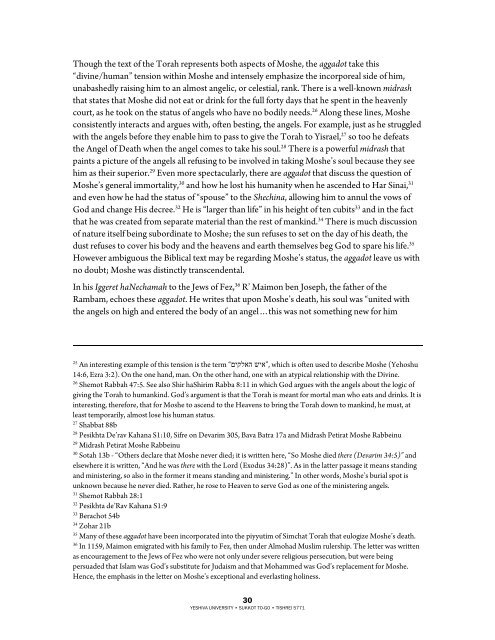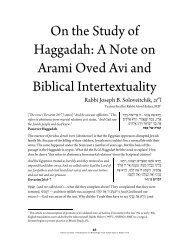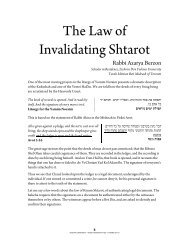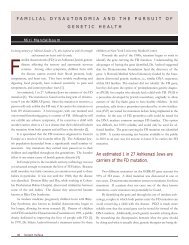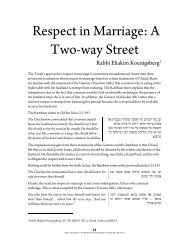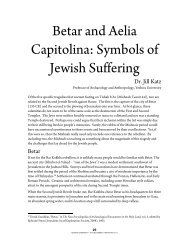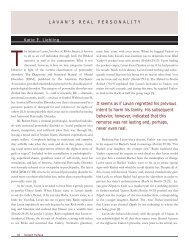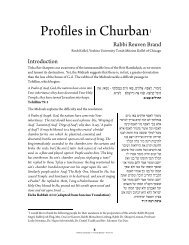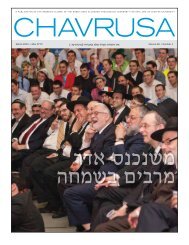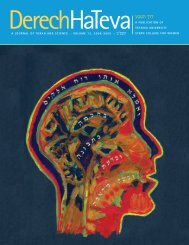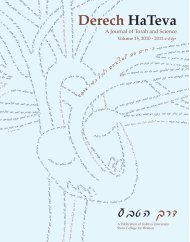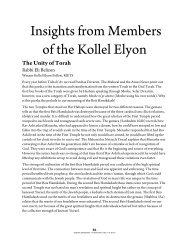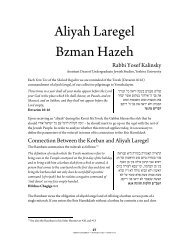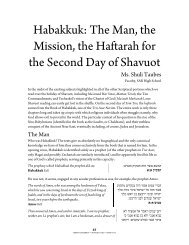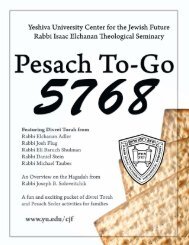YESHIVA UNIVERSITY • SUKKOT TO-GO ... - YU Torah Online
YESHIVA UNIVERSITY • SUKKOT TO-GO ... - YU Torah Online
YESHIVA UNIVERSITY • SUKKOT TO-GO ... - YU Torah Online
You also want an ePaper? Increase the reach of your titles
YUMPU automatically turns print PDFs into web optimized ePapers that Google loves.
Though the text of the <strong>Torah</strong> represents both aspects of Moshe, the aggadot take this<br />
“divine/human” tension within Moshe and intensely emphasize the incorporeal side of him,<br />
unabashedly raising him to an almost angelic, or celestial, rank. There is a well-known midrash<br />
that states that Moshe did not eat or drink for the full forty days that he spent in the heavenly<br />
court, as he took on the status of angels who have no bodily needs. 26 Along these lines, Moshe<br />
consistently interacts and argues with, often besting, the angels. For example, just as he struggled<br />
with the angels before they enable him to pass to give the <strong>Torah</strong> to Yisrael, 27 so too he defeats<br />
the Angel of Death when the angel comes to take his soul. 28 There is a powerful midrash that<br />
paints a picture of the angels all refusing to be involved in taking Moshe’s soul because they see<br />
him as their superior. 29 Even more spectacularly, there are aggadot that discuss the question of<br />
Moshe’s general immortality, 30 and how he lost his humanity when he ascended to Har Sinai, 31<br />
and even how he had the status of “spouse” to the Shechina, allowing him to annul the vows of<br />
God and change His decree. 32 He is “larger than life” in his height of ten cubits 33 and in the fact<br />
that he was created from separate material than the rest of mankind. 34 There is much discussion<br />
of nature itself being subordinate to Moshe; the sun refuses to set on the day of his death, the<br />
dust refuses to cover his body and the heavens and earth themselves beg God to spare his life. 35<br />
However ambiguous the Biblical text may be regarding Moshe’s status, the aggadot leave us with<br />
no doubt; Moshe was distinctly transcendental.<br />
In his Iggeret haNechamah to the Jews of Fez, 36 R’ Maimon ben Joseph, the father of the<br />
Rambam, echoes these aggadot. He writes that upon Moshe’s death, his soul was “united with<br />
the angels on high and entered the body of an angel…this was not something new for him<br />
25 An interesting example of this tension is the term “םיקלאה שיא”, which is often used to describe Moshe (Yehoshu<br />
14:6, Ezra 3:2). On the one hand, man. On the other hand, one with an atypical relationship with the Divine.<br />
26 Shemot Rabbah 47:5. See also Shir haShirim Rabba 8:11 in which God argues with the angels about the logic of<br />
giving the <strong>Torah</strong> to humankind. God’s argument is that the <strong>Torah</strong> is meant for mortal man who eats and drinks. It is<br />
interesting, therefore, that for Moshe to ascend to the Heavens to bring the <strong>Torah</strong> down to mankind, he must, at<br />
least temporarily, almost lose his human status.<br />
27 Shabbat 88b<br />
28 Pesikhta De’rav Kahana S1:10, Sifre on Devarim 305, Bava Batra 17a and Midrash Petirat Moshe Rabbeinu<br />
29 Midrash Petirat Moshe Rabbeinu<br />
30 Sotah 13b - “Others declare that Moshe never died; it is written here, “So Moshe died there (Devarim 34:5)” and<br />
elsewhere it is written, “And he was there with the Lord (Exodus 34:28)”. As in the latter passage it means standing<br />
and ministering, so also in the former it means standing and ministering.” In other words, Moshe’s burial spot is<br />
unknown because he never died. Rather, he rose to Heaven to serve God as one of the ministering angels.<br />
31 Shemot Rabbah 28:1<br />
32 Pesikhta de’Rav Kahana S1:9<br />
33 Berachot 54b<br />
34 Zohar 21b<br />
35 Many of these aggadot have been incorporated into the piyyutim of Simchat <strong>Torah</strong> that eulogize Moshe’s death.<br />
36 In 1159, Maimon emigrated with his family to Fez, then under Almohad Muslim rulership. The letter was written<br />
as encouragement to the Jews of Fez who were not only under severe religious persecution, but were being<br />
persuaded that Islam was God’s substitute for Judaism and that Mohammed was God’s replacement for Moshe.<br />
Hence, the emphasis in the letter on Moshe’s exceptional and everlasting holiness.<br />
30<br />
<strong>YESHIVA</strong> <strong>UNIVERSITY</strong> <strong>•</strong> <strong>SUKKOT</strong> <strong>TO</strong>-<strong>GO</strong> <strong>•</strong> TISHREI 5771


